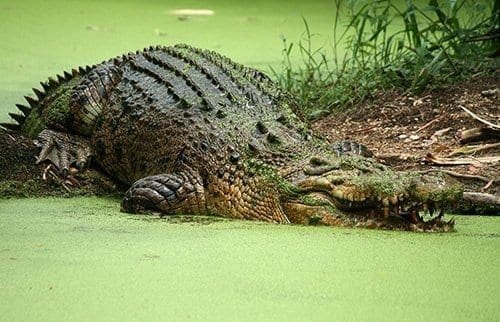
The world of conservation can sometimes feel overwhelming, like trying to read a map in a foreign country without knowing the language. Saltwater crocodiles have long been both revered and feared, and their conservation status is crucial, not just for the species itself but for the ecosystems they inhabit. Let’s dive into some insights on their current situation and the efforts being made to keep this remarkable animal thriving.
What’s the Current Status of Saltwater Crocodiles?
To get a clear picture, let’s first look at the conservation status of saltwater crocodiles. According to the International Union for Conservation of Nature (IUCN), saltwater crocodiles are classified as “Least Concern.” This means that, overall, they aren’t considered endangered. But hold on; that doesn’t tell the whole story. The situation varies dramatically by region.
In some areas, particularly in parts of Southeast Asia, their populations have declined due to habitat loss and hunting. Imagine a bustling city where buildings constantly replace parks—animals can’t just set up shop where they please, right? That’s similar to what’s happening with saltwater crocodiles in certain regions, where their natural habitats are shrinking.
Why Are Some Populations Declining?
You might be thinking, “Why on Earth would these powerful animals be at risk?” Well, there are a few key factors at play:
- Habitat Destruction: Wetlands and mangroves—their cozy homes—are being cleared for agriculture and urban development.
- Illegal Hunting: Although hunting is regulated in many places, poaching still occurs, driven by demand for their skins and meat.
- Human-Crocodile Conflict: As humans expand into crocodile territory, encounters often lead to fearful reactions, resulting in the killing of these animals.
Essentially, you can think of saltwater crocodiles as the canary in the coal mine for freshwater health. Their struggles often signal broader environmental issues that affect many species.
Conservation Efforts Around the World
So, what’s being done to protect these incredible creatures? Various organizations and governments are stepping up to help saltwater crocodiles thrive. Conservationists are like detectives, piecing together clues to understand these reptiles better and find effective solutions. Here are some notable efforts:
– Protected Areas: Many regions have established protected zones where crocodiles can live and breed without disruption. This is critical—think of it like giving them a safe haven in a busy world.
– Community Engagement: Local communities are being educated on the importance of crocodiles in their ecosystems. Teaching people about the balance of nature can change perceptions and foster coexistence.
– Sustainable Practices: Efforts to regulate hunting have led to more sustainable practices that allow human use while ensuring crocodile populations remain healthy.
The Role of Saltwater Crocodiles in Their Ecosystem
You might wonder why we should care so much about saltwater crocodiles. They’re not just cool-looking reptiles; they play a crucial role in their ecosystems. Here’s how:
– Top Predators: As apex predators, they help control other animal populations. This control prevents overgrazing and keeps the ecosystem balanced, similar to how wolves control deer populations in the forest.
– Scavengers: They eat carrion, helping to clean up their habitats. Think of them as nature’s cleanup crew, maintaining the health of their environment.
– Biodiversity Indicators: Healthy crocodile populations often indicate a robust ecosystem. If they thrive, it suggests other species and the environment are also doing well.
Community Involvement in Conservation
Connecting with local communities is vital for the long-term success of saltwater crocodile conservation. Simply putting up a fence around a crocodile habitat won’t cut it. Engagement creates a sense of ownership and responsibility. Here’s how communities are getting involved:
– Awareness Campaigns: Programs in schools teach children about saltwater crocodiles and their importance, promoting a future generation that values wildlife.
– Eco-Tourism: In some regions, eco-tourism centered around crocodiles can provide a sustainable income while fostering a respect for these majestic animals. Imagine folks traveling thousands of miles to see the crocodiles in their natural habitat—that generates funds for conservation!
– Research Partnerships: Local communities often collaborate with researchers to monitor crocodile populations and share valuable knowledge about their behaviors and habitats.
What’s Next for Saltwater Crocodiles?
Looking ahead, the future of saltwater crocodiles will depend on a combination of efforts. Even though they’re not classified as endangered worldwide, regions facing threats need continuous monitoring and proactive measures. The landscape for these reptiles can change quickly—think of a river that shifts course after a storm.
Conservationists and local communities must continue to work together to adapt and respond to challenges. Ongoing research, stricter laws against poaching, and continuous habitat protection are just a few ways we can ensure saltwater crocodiles remain a vital part of our world.
How Can You Help?
Maybe you’re wondering how you can contribute to saltwater crocodile conservation from wherever you are. Fortunately, there are plenty of ways you can make a difference:
– Support Conservation Organizations: Donating to groups that focus on wildlife preservation helps fund important research and protective measures.
– Educate Yourself and Others: Share what you learn about saltwater crocodiles and their ecosystems. The more people know, the more they can advocate for these creatures.
– Responsible Tourism: When traveling to areas with crocodiles, choose tours that promote conservation and respect for wildlife.
Ultimately, protecting saltwater crocodiles isn’t just about saving one species; it’s about maintaining the health of entire ecosystems and ensuring future generations get to experience their majesty.
In conclusion, while saltwater crocodiles might not be endangered globally, many populations face significant challenges. Working together, we can help ensure these incredible creatures continue to thrive in their natural habitats, serving as an important part of our ecosystem. Whether it’s through education, conservation efforts, or simply spreading awareness, every effort counts in this shared journey towards preservation.
